- All
- Product Name
- Product Keyword
- Product Model
- Product Summary
- Product Description
- Multi Field Search
Views: 21 Author: Site Editor Publish Time: 2023-10-24 Origin: Site








Gardens are our own personal sanctuaries, a place where we can relax, unwind, and connect with nature. To ensure your garden remains a tranquil haven, you must carefully consider the type of fence that surrounds it. The right garden fence not only adds aesthetic appeal but also serves practical purposes like security and privacy. In this comprehensive guide, we'll walk you through the key factors to consider when choosing the best fence for your garden.

Garden fencing is often an overlooked feature, but it plays a pivotal role in the functionality and aesthetics of your outdoor space. Here, we'll delve into the significance of garden fencing and why it should be a priority for any garden owner.
One of the primary functions of garden fencing is to establish clear boundaries. It demarcates your property, ensuring that you and your neighbors know where your garden begins and ends. This simple act of defining space can prevent disputes and keep your garden secure.
Privacy is a valuable commodity, and a well-designed garden fence can provide it in abundance. It shields your garden from prying eyes, giving you a sense of seclusion. Additionally, it serves as a security feature, deterring trespassers and protecting your property.
Your garden is a canvas waiting to be painted, and the right garden fence can be your brushstroke of elegance. Let's explore how the choice of fencing can drastically improve your garden's aesthetics.

Garden fencing comes in a myriad of styles, materials, and designs. From classic wooden fences to modern metal ones, there's a fence to complement every garden's unique style. By selecting the right design, you can create a cohesive and visually appealing outdoor space.
Garden fencing isn't merely a barrier; it can be a canvas for vertical landscaping. Vines and climbing plants can be trained to grow along the fence, adding a lush, green dimension to your garden. This not only enhances aesthetics but also attracts beneficial wildlife.
Modern garden fencing offers ample room for customization. You can paint your fence to match your garden's color scheme or add decorative elements like trellises and ornamental posts. This turns your fence into an artistic statement that complements your garden's overall look.
Garden fencing goes beyond looks; it serves a range of practical purposes. Let's explore the various functional aspects that make garden fencing an essential part of any outdoor space.

A well-constructed fence acts as a barrier against common garden pests such as rabbits and deer. It can safeguard your plants and crops, ensuring a bountiful garden harvest.
In areas prone to strong winds, a garden fence can function as a windbreak. This not only protects your plants from wind damage but also creates a more pleasant outdoor environment for you and your guests.
For those in noisy neighborhoods, a solid garden fence can reduce unwanted noise, transforming your garden into a tranquil oasis where you can relax and unwind.

Wooden garden fences are timeless and versatile. They offer a rustic charm and blend seamlessly with natural surroundings. Here are some key points about wood fences:
Aesthetic Appeal: Wood fences are known for their natural beauty. They can be stained or painted in various colors to match your garden's style.
Privacy: Solid wooden fences provide excellent privacy, making them ideal for creating secluded garden spaces.
Customization: You can choose from a variety of wood types, such as cedar or redwood, each with unique characteristics. Wooden fences also allow for customization with decorative elements like lattice tops.
Maintenance: Regular maintenance is essential to prevent rot and ensure the longevity of wood fences. This includes staining or painting and sealing to protect against weathering.
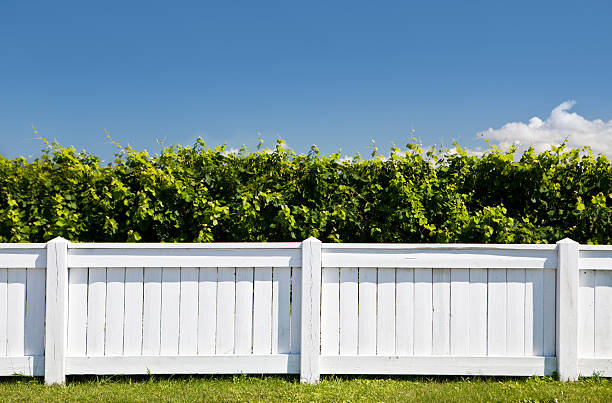
Vinyl garden fences are a modern and low-maintenance option. They offer a sleek, clean look and come with several advantages:
Durability: Vinyl is highly resistant to moisture, UV rays, and pests, making it a long-lasting choice for garden fencing.
Low Maintenance: Unlike wood, vinyl fences don't require staining, painting, or sealing. A simple occasional cleaning with water and soap is usually sufficient.
Variety: Vinyl fences come in various styles and colors, allowing for customization to match your garden's aesthetics.
Cost-Effective: While vinyl fences may have a higher upfront cost, their durability and low maintenance can save you money in the long run.
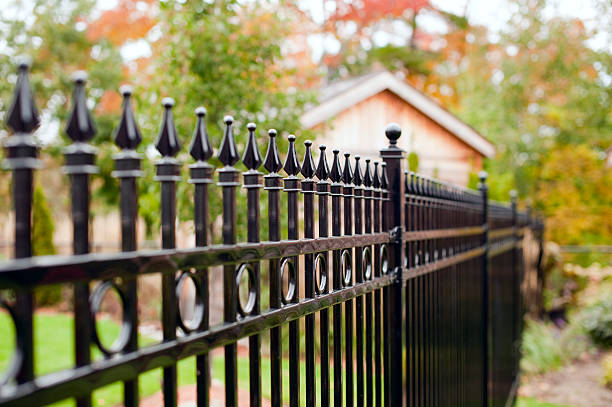
Metal garden fences are sturdy and provide an elegant, open look. They have their own set of advantages:
Security: Metal fences, especially those with ornamental designs, offer excellent security. They are difficult to breach and deter intruders.
Longevity: Metal fences are known for their durability and resistance to the elements. They are unlikely to rot, warp, or fade.
Versatility: Metal fences can be made from various metals, including iron, aluminum, and steel. They can be customized with decorative elements and are available in different heights and styles.
Maintenance: Regular maintenance involves rust prevention and repainting, particularly for iron fences.
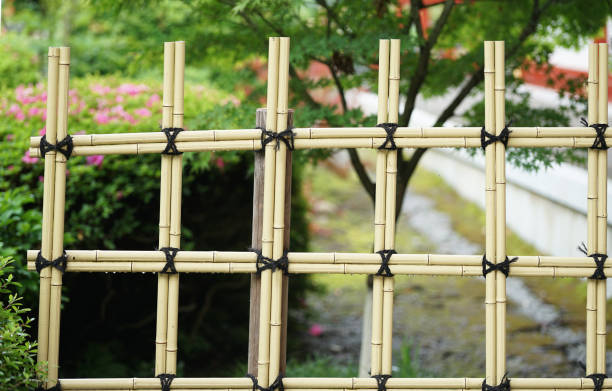
Bamboo garden fences offer a unique and eco-friendly option for those seeking a natural look:
Eco-Friendly: Bamboo is a renewable resource, making it an environmentally conscious choice. It grows rapidly and can be harvested without harming the plant.
Aesthetic Appeal: Bamboo fences provide a natural and exotic appearance, adding a touch of the orient to your garden.
Privacy: Bamboo fences can be designed to provide privacy while still allowing airflow and light to pass through.
Maintenance: Bamboo requires occasional treatment to prevent decay, such as sealing with a weather-resistant finish.

Before choosing a fence, determine its primary purpose. Common reasons for installing a garden fence include:
Property Boundary: Defining the boundaries of your garden to prevent encroachment.
Privacy: Creating a secluded space for relaxation and outdoor activities.
Security: Deterring trespassers, both human and wildlife.
Decoration: Enhancing the overall aesthetics of your garden.
Plant Protection: Safeguarding your plants from animals or environmental factors.
Consider your privacy needs when choosing a fence:
Full Privacy: If you desire complete seclusion, opt for a solid fence with no gaps between boards or panels.
Partial Privacy: For a balance between privacy and visibility, choose a fence with spacing or materials that offer partial obstruction.
Decorative Privacy: Some fences combine privacy with decorative elements like lattice tops, providing an elegant touch.
Assess your security requirements:
Deterrence: If deterring intruders is a concern, opt for a sturdy fence that is difficult to climb or breach.
Height: A taller fence can enhance security and keep larger animals out.
Lockable Gates: Consider whether you need gates with locks for added security.
Your garden fence should harmonize with your garden's style:
Material: Choose a material that complements your garden's overall look, whether it's wood, vinyl, metal, or bamboo.
Color: Consider whether you want to paint or stain your fence to match your garden's color scheme.
Decorative Elements: Some fences can be customized with decorative posts, lattice, or ornamental designs to enhance the aesthetics.
The level of maintenance you're willing to undertake can influence your choice:
Low Maintenance: Vinyl and metal fences typically require less maintenance than wood. They don't need staining, painting, or sealing.
Moderate Maintenance: Wood fences require regular maintenance to prevent rot and weathering.
Bamboo Maintenance: Bamboo fences need occasional treatment to prevent decay, such as sealing with a weather-resistant finish.
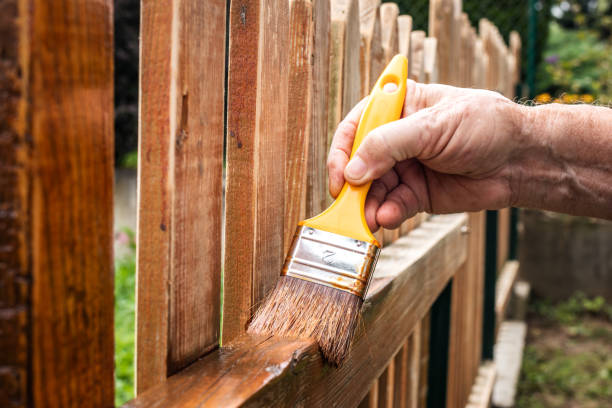
Durability: Wood fences are durable but can be susceptible to rot and insect damage without proper maintenance.
Lifespan: Properly maintained wood fences can last 20-25 years or longer.
Durability: Vinyl is highly durable and resistant to moisture and pests.
Lifespan: Vinyl fences can last 20-30 years or more, often outlasting wood.
Durability: Metal fences are highly durable and resistant to weather and pests.
Lifespan: Metal fences can last 30-50 years, with proper maintenance.
Durability: Bamboo is durable, especially when treated to prevent decay.
Lifespan: Well-maintained bamboo fences can last 15-20 years.
Maintenance: Wood fences require regular staining, painting, and sealing to prevent rot and maintain their appearance.
Labor: Higher maintenance effort and costs.
Maintenance: Low maintenance, requiring occasional cleaning with water and soap.
Labor: Minimal maintenance effort and costs.
Maintenance: Regular maintenance includes rust prevention and occasional repainting.
Labor: Moderate maintenance effort and costs.
Maintenance: Occasional treatment is needed to prevent decay.
Labor: Moderate maintenance effort and costs.
Eco-Friendly: Natural wood is biodegradable and renewable when sourced responsibly.
Eco-Friendly: Vinyl is not biodegradable and is derived from petrochemicals, which can raise environmental concerns.
Eco-Friendly: Metal is recyclable but may have a higher initial environmental impact due to manufacturing processes.
Eco-Friendly: Bamboo is highly sustainable, growing rapidly and considered eco-friendly.
Visual Appeal: Natural and classic look, can be customized with various stains and paints.
Visual Appeal: Clean and modern appearance, available in different styles and colors.
Visual Appeal: Elegant and sturdy, often used for ornamental purposes.
Visual Appeal: Natural and exotic, adding an oriental touch to your garden.
When it comes to the design and style of your garden fence, there are several options to choose from, each with its own unique characteristics:

Picket fences are iconic and timeless, known for their charming and traditional appearance. Key features include:
Aesthetic: Picket fences are characterized by evenly spaced vertical boards or pickets, often with a scalloped or straight design along the top.
Function: They are excellent for demarcating garden boundaries and adding a classic, welcoming touch to your outdoor space.
Variety: Picket fences can be made from wood, vinyl, or metal, allowing for customization in terms of material and height.
Privacy: They offer partial privacy, making them ideal for defining spaces without completely obstructing views.

Lattice fences are both functional and decorative, with an openwork design that adds a touch of elegance. Key features include:
Aesthetic: Lattice fences feature crisscross or diagonal patterns created by thin strips of wood, vinyl, or metal.
Function: They are perfect for enhancing privacy and creating a visually appealing backdrop for climbing plants.
Variety: Lattice fences are available in various materials, colors, and patterns, allowing you to match them with your garden's style.
Privacy: Lattice fences can provide partial to full privacy, depending on the spacing and material used.

Panel and slat fences offer a versatile and contemporary look, suitable for a range of garden styles. Key features include:
Aesthetic: These fences are made up of horizontal or vertical panels or slats that can be spaced closely for more privacy or wider for a more open appearance.
Function: They are practical for defining boundaries and can be designed to accommodate different levels of privacy.
Variety: Panel and slat fences come in various materials, including wood, vinyl, metal, and can be customized in terms of style and color.
Privacy: Depending on the spacing, they can provide partial to complete privacy.
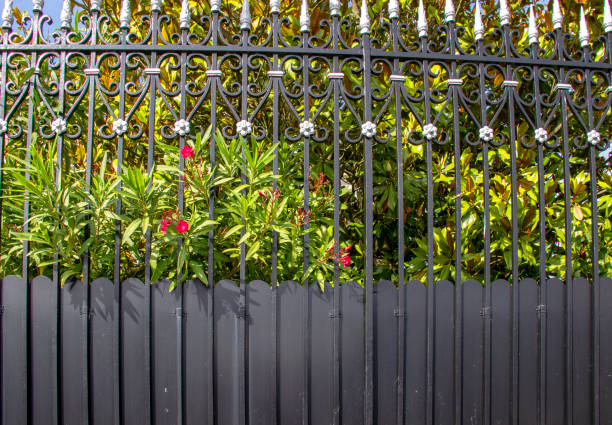
Contemporary and modern fence designs are characterized by sleek, minimalistic, and often unconventional appearances. Key features include:
Aesthetic: These designs typically incorporate clean lines, geometric shapes, and unique materials like metal or glass.
Function: They can serve as architectural focal points in your garden while still offering privacy and security.
Variety: You have the freedom to choose unconventional materials and designs to match a modern aesthetic.
Most garden fences can be customized to meet your specific preferences, including:
Color: Many fences can be painted or stained to match your garden's color scheme.
Decorative Elements: Elements like ornamental posts, caps, and finials can be added for a personal touch.
Height: Depending on your privacy and security needs, fences can be adjusted in height.
Material: Choose from wood, vinyl, metal, or bamboo, depending on your preferred aesthetic and maintenance level.
Selecting the right color for your garden fence is a significant decision, and it can greatly impact the overall look and feel of your outdoor space. Here are some considerations for color selection:

Natural wood finishes emphasize the inherent beauty of the wood and are an excellent choice if you want to maintain a more traditional and rustic appearance. Key points include:
Aesthetic Appeal: Natural wood finishes bring out the unique characteristics of the wood, showcasing its grain and texture.
Warmth: They add warmth to your garden and create a cozy and inviting atmosphere.
Complementing Greenery: Natural wood complements the greenery in your garden and offers a harmonious, organic look.
Painted options offer a broad range of color choices, allowing you to achieve a customized and creative look. Key points include:
Aesthetic Flexibility: Painting your fence provides the flexibility to match your garden's color scheme or achieve a particular theme.
Personalization: You can express your style and personality through the choice of paint color.
Contrasting or Blending: Paint can be used to either contrast with or blend in with the surrounding elements in your garden.
Staining your fence is a practical choice if you want to balance aesthetics with durability and longevity. Key points include:
Protection: Stains offer protection against moisture, UV rays, and insect damage, enhancing the lifespan of the wood.
Aesthetic Enhancement: Stains come in various tints, allowing you to add color while preserving the wood's natural appearance.
Low Maintenance: Stained fences often require less maintenance compared to paint, as they can be reapplied less frequently.
When selecting the color for your garden fence, consider how it coordinates with your overall garden aesthetics:
Plant Colors: Choose a color that complements the colors of your garden's plants, flowers, and hardscape elements.
Garden Theme: If you have a specific garden theme (e.g., a Japanese garden or a cottage garden), select a color that aligns with that theme.
In this discussion about garden fences, we've highlighted several key points to consider:
Purpose and Function: Determine the primary purpose of your garden fence, whether it's for defining boundaries, providing privacy, enhancing security, adding aesthetics, or protecting your plants.
Material Comparison: Evaluate the material of your fence based on factors like durability, maintenance requirements, eco-friendliness, cost, and visual appeal.
Design and Style: Explore various fence designs, such as picket fences, lattice fences, panel and slat fences, contemporary designs, and customization options to match your garden's aesthetics.
Color Selection: Choose a color that aligns with your garden's overall theme and your personal preferences, whether it's a natural wood finish, a painted option, staining for longevity, or a coordinating color.
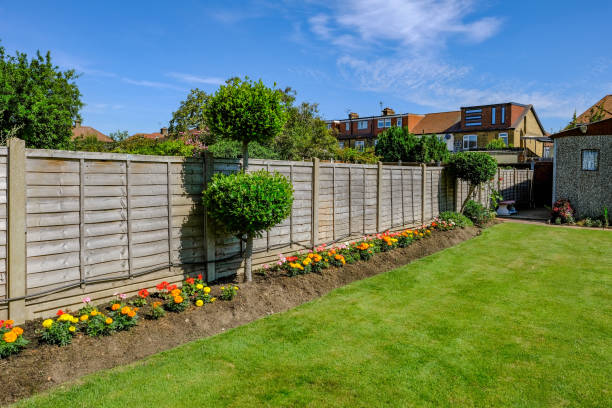
A well-chosen garden fence offers enduring benefits. It defines the character of your garden, enhancing its aesthetics and providing essential functions like privacy, security, and plant protection. A garden fence, when selected thoughtfully, transforms your outdoor space into a haven of beauty and tranquility.
It serves not only as a physical barrier but as a statement of your style and taste. The right garden fence can evoke a sense of warmth and comfort while adding an elegant touch to your garden. Its impact lasts for years, becoming an integral part of your garden's identity.
So, remember that your choice of a garden fence is not just a decision for today; it's an investment in the lasting appeal, functionality, and atmosphere of your outdoor sanctuary. Make the choice that truly reflects your vision and the unique character of your garden.